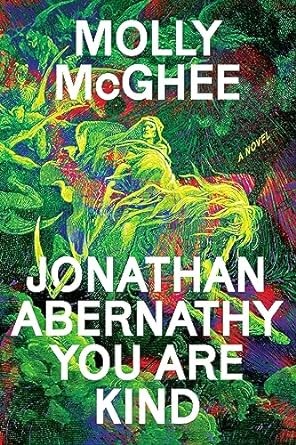sol2070 reviewed Jonathan Abernathy You Are Kind by Molly McGhee
Exemplary anti-capitalist sci-fi
5 stars
(em português → sol2070.in/2029/08/livro-jonathan-abernathy-you-are-kind/ )
"Jonathan Abernathy You Are Kind" (2023), by Molly McGhee, is a stupendously sad satire that's hard to put down. Dystopian science fiction about meaningless work, depression, romance and loneliness.
The atmosphere is very reminiscent of the Brazilian classic "The Hour of the Star" (1977), by Clarice Lispector, as well as the film "Eternal Sunshine of a Spotless Mind" (2004). But there's a macabre humour.
I didn't catch the spirit of it at first and abandoned it within the first twenty pages. I didn't get the tone, which seemed too derogatory: the protagonist of the title is dull and miserable in every way, and spends his time filling his mind with self-help affirmations, like the phrase that gives the book its name.
As I kept hearing praise for the book from people I trust, I gave it another go. What I hadn't picked up on was the nuance in the way the story is told (there are revelations about this at the end). No, the story doesn't make fun of the victims of hyper-capitalist misfortune, quite the opposite.
The book finally got going and I finished it in a few days. It was one of the best dystopian stories I've ever read. It ravages the heart without mercy, but there are also memorable breaths of tender beauty. When I finished the book, I kept trying to understand what had just hit me.
The protagonist, Abernathy, lives the reality of terminal indebtedness, which is now common in the USA, especially among young people. In the country that would be the richest in the world according to the GDP metric, it is common for recent college graduates not to get jobs in their fields, sometimes spending decades underemployed just to pay the interest on the debts they took out to study.
This isn't exactly the case for Abernathy, his story is even worse. But he does get a job as a ‘dream auditor’. Corporations and the government are dealing with the epidemic of mental disorders (not at all fictitious) with a new technology capable of removing the disturbing elements from their minds by invading their night-time dreams. In this way, the massive drop in productivity that threatens the economy can be reversed. By day, Abernathy sells hot dogs; by night, when he goes to sleep, he has to immerse himself in other people's nightmares and traumas.
Fiction with a visceral political critique done in an exemplary way.

